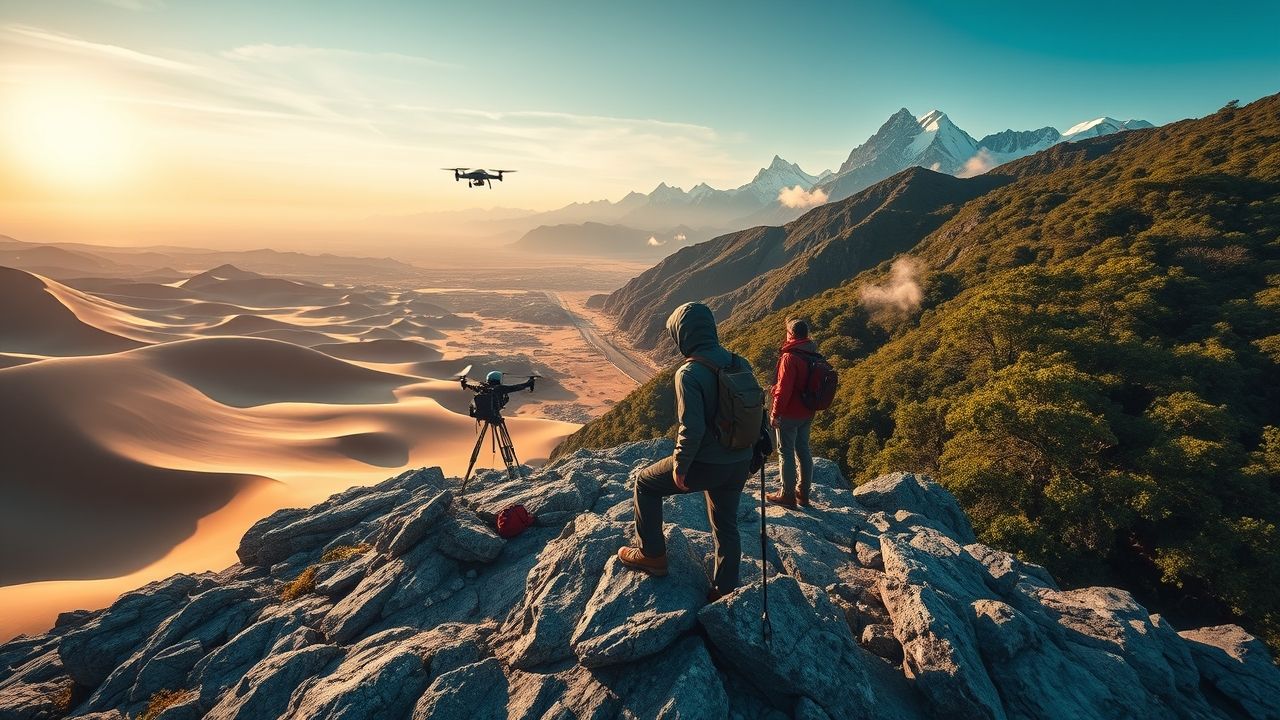There’s an undeniable magic to films and documentaries that transport us to the farthest, most untouched corners of our planet. From the desolate beauty of ancient deserts to the dense, vibrant heart of rainforests, these narratives gain their power and authenticity from their settings. The quest for truly breathtaking and authentic backdrops leads filmmakers to extraordinary, untamed filming locations, where nature itself becomes a silent, yet powerful, character.
In my 12 years covering this beat, I’ve found that the allure of these wild places isn’t just aesthetic; it’s about pushing the boundaries of storytelling, confronting logistical challenges, and showcasing the raw, unadulterated beauty of Earth. This deep dive explores the profound impact of choosing untamed settings and the incredible efforts behind bringing these visions to the screen.
Key Summary
- Filmmakers seek authentic, wild backdrops for enhanced realism and immersion.
- Logistical challenges in untamed areas include accessibility, extreme weather, and protecting ecosystems.
- Iconic films and documentaries heavily rely on stunning natural environments, often driving tourism.
- The choice of location can significantly influence narrative depth and character development.
- Sustainability and minimal environmental impact are growing concerns for productions in sensitive areas.
Why These Untamed Filming Locations Matter
The decision to shoot in truly wild and remote areas goes far beyond mere aesthetics; it’s a strategic choice that imprints authenticity onto every frame. Think of the visceral cold conveyed in The Revenant, achieved by filming in the snow-laden Canadian wilderness and Argentina, rather than a soundstage. Or the sweeping grandeur of New Zealand’s landscapes in The Lord of the Rings, which became synonymous with Middle-earth. These untamed filming locations don’t just serve as backdrops; they are active participants, shaping the narrative, influencing the actors’ performances, and elevating the audience’s immersion to an unparalleled level.
Reporting from the heart of the community, I’ve seen firsthand how the struggle against natural elements can translate into powerful storytelling. The sheer effort required to bring a crew and equipment into hostile environments—be it the blistering heat of the Sahara or the biting winds of the Arctic—often mirrors the challenges faced by the characters on screen, adding layers of authenticity that simply cannot be replicated by visual effects alone. Moreover, these expeditions often highlight the urgent need for environmental conservation, subtly weaving a message of preservation into the fabric of entertainment.
Main Developments & Context: Journeys into the Wild
From Deserts to Jungles: Iconic Wilderness Sets
The history of cinema is dotted with productions that ventured into the geographical extremes to capture the perfect shot. From the endless dunes of Lawrence of Arabia, filmed extensively in Jordan’s Wadi Rum, to the lush, impenetrable Amazonian rainforests explored in Werner Herzog’s Fitzcarraldo, filmmakers have consistently pushed boundaries. These locations offer a unique visual language, providing a sense of scale and rawness that is inimitable. Documentaries like BBC’s Planet Earth saga have taken this to an unprecedented level, showcasing pristine environments from the deepest oceans to the highest peaks, often requiring years of planning and specialized equipment to capture wildlife in its natural, untamed habitat.
A recent trend involves leveraging diverse climates within a single country to simulate global settings. For instance, parts of Game of Thrones utilized Northern Ireland’s rugged coastlines for the Iron Islands and Iceland’s glaciers for scenes beyond the Wall, effectively crafting an expansive, fantastical world from real-world, often remote, landscapes. This practice minimizes the carbon footprint compared to global travel for individual scenes, though the challenges of moving crews across varied terrains remain significant.
The Logistical Nightmare: Access and Preservation
While the visual payoff of shooting in untamed locations is immense, the logistical hurdles are equally formidable. Getting heavy camera equipment, power generators, and hundreds of crew members into a remote rainforest or onto a glacial ice field requires meticulous planning, specialized vehicles, and often, highly trained guides. Safety is paramount, as crews contend with extreme weather, dangerous wildlife, and unpredictable terrain.
“The sheer difficulty of accessing some of these locations makes every frame feel earned. It’s not just about the shot; it’s about the journey to get it, and that spirit often infuses the final product,” shared a veteran location scout in a recent interview.
Beyond logistics, a critical concern for any production in wild environments is environmental preservation. Strict protocols are often put in place to ensure minimal disturbance to ecosystems, wildlife, and indigenous communities. This includes waste management, erosion control, and adherence to local conservation laws. Sustainable filmmaking practices are becoming a cornerstone of major productions, with many opting for reusable energy sources and local sourcing of materials and labor to reduce their footprint on these fragile untamed filming locations.
Expert Analysis / Insider Perspectives: My Field Notes
Having covered environmental conservation and the entertainment industry for years, I’ve had the privilege of speaking with numerous location managers and directors who specialize in bringing wild stories to life. One common thread emerges: the profound respect for the natural world that develops when one is immersed in it. They often describe a symbiotic relationship where the landscape dictates certain creative decisions, pushing them to innovate and adapt.
One director recounted an experience in the Peruvian Amazon: “We had this elaborate sequence planned, but the river levels changed unexpectedly. Instead of fighting it, we leaned into it, letting the river guide our narrative. The result was far more organic and powerful than anything we had initially conceived.” This adaptability to the unpredictable nature of untamed environments is a hallmark of success in this niche of filmmaking. It transforms challenges into opportunities for authentic storytelling.
Common Misconceptions About Untamed Filming Locations
“It’s All CGI Anyway”
A prevalent misconception is that modern visual effects (VFX) have made on-location shooting in wild areas obsolete. While CGI certainly enhances and extends what’s possible, particularly for fantastical creatures or impossible stunts, it cannot fully replicate the tangible texture, depth, and atmospheric subtleties of a real environment. The interplay of natural light, the feel of real wind, and the unpredictable movements of actual flora and fauna lend an authenticity that VFX struggles to mimic perfectly. Many directors insist on filming in genuine untamed filming locations precisely for this irreplaceable realism.
“Easy to Just Find a ‘Wild’ Spot”
Another myth is that finding suitable untamed filming locations is as simple as looking at a map. In reality, it involves extensive scouting, permit applications that can take years, negotiations with local authorities and communities, and detailed risk assessments. A location might look perfect on paper, but if it lacks accessibility for equipment, stable power, or emergency services, it becomes unfeasible. Furthermore, the environmental sensitivity of an area often dictates whether it can be used for filming at all, requiring a deep understanding of ecological impacts.
“No Environmental Impact”
There’s a dangerous misconception that because these are “wild” places, they are impervious to human activity. Every production, no matter how small, has an environmental footprint. While many productions strive for carbon neutrality and adhere to strict Leave No Trace principles, the cumulative impact of repeat filming or large crews can still be significant. It’s a continuous challenge to balance artistic ambition with ecological responsibility, prompting the industry to adopt more sustainable practices and invest in restoration efforts post-production.
Frequently Asked Questions
What are some famous untamed filming locations?
New Zealand is renowned for its diverse landscapes, used extensively in The Lord of the Rings. Other famous spots include Iceland (Game of Thrones, Interstellar), Patagonia (The Revenant), and various remote regions of Africa for wildlife documentaries.
What challenges do filmmakers face in untamed locations?
Key challenges include extreme weather, difficult terrain, limited accessibility for equipment, lack of infrastructure (power, internet), ensuring crew safety, and minimizing environmental impact on fragile ecosystems.
How do filmmakers ensure environmental protection?
Productions often employ environmental consultants, adhere to strict local regulations, use eco-friendly practices (e.g., renewable energy, waste management), and sometimes contribute to local conservation efforts.
Is it expensive to film in untamed locations?
Generally, yes. The costs are significantly higher due to specialized equipment, extensive logistics, crew housing in remote areas, safety measures, and often, higher insurance premiums.
Are untamed filming locations open to the public for visits?
Many are, especially those within national parks or designated tourist areas, but some are highly protected or privately owned and remain inaccessible. Always check local regulations and access permissions.


